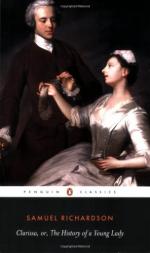Your loving sister, and true friend,
Arabella Harlowe.
LETTER XI
To his dear niece, miss Clarissa
Harlowe
Wednesday, Sept. 6.
We were greatly grieved, my beloved Miss Clary, at your fault; but we are still more, if possible, to hear you are so very ill; and we are sorry things have been carried so far. We know your talents, my dear, and how movingly you could write, whenever you pleased; so that nobody could ever deny you any thing; and, believing you depended on your pen, and little thinking you were so ill, and that you lived so regular a life, and are so truly penitent, are must troubled every one of us, your brother and all, for being so severe. Forgive my part in it, my dearest Clary. I am your second papa, you know. And you used to love me.
I hope you’ll soon be able to come down, and, after a while, when your indulgent parents can spare you, that you will come to me for a whole month, and rejoice my heart, as you used to do. But if, through illness, you cannot so soon come down as we wish, I will go up to you; for I long to see you. I never more longed to see you in my life; and you was always the darling of my heart, you know.
My brother Antony desires his hearty commendations to you, and joins with me in the tenderest assurance, that all shall be well, and, if possible, better than ever; for we now have been so long without you, that we know the miss of you, and even hunger and thirst, as I may say, to see you, and to take you once more to our hearts; whence indeed you was never banished so far as our concern for the unhappy step made us think and you believe you were. Your sister and brother both talk of seeing you in town; so does my dear sister, your indulgent mother.
God restore your health, if it be his will; else, I know not what will become of
Your truly loving uncle, and second papa,
John Harlowe.
LETTER XII
Mr. Belford, to Robert Lovelace,
Esq.
Friday night, Sept. 8, Past ten.
I will now take up the account of our proceedings from my letter of last night, which contained the dying words of this incomparable lady.
As soon as we had seen the last scene closed (so blessedly for herself!) we left the body to the care of the good women, who, according to the orders she had given them that very night, removed her into that last house which she had displayed so much fortitude in providing.
In the morning, between seven and eight o’clock, according to appointment, the Colonel came to me here. He was very much indisposed. We went together, accompanied by Mrs. Lovick and Mrs. Smith, into the deceased’s chamber. We could not help taking a view of the lovely corpse, and admiring the charming serenity of her noble aspect. The women declared they never say death so lovely before; and that she looked as if in an easy slumber, the colour having not quite left her cheeks and lips.




